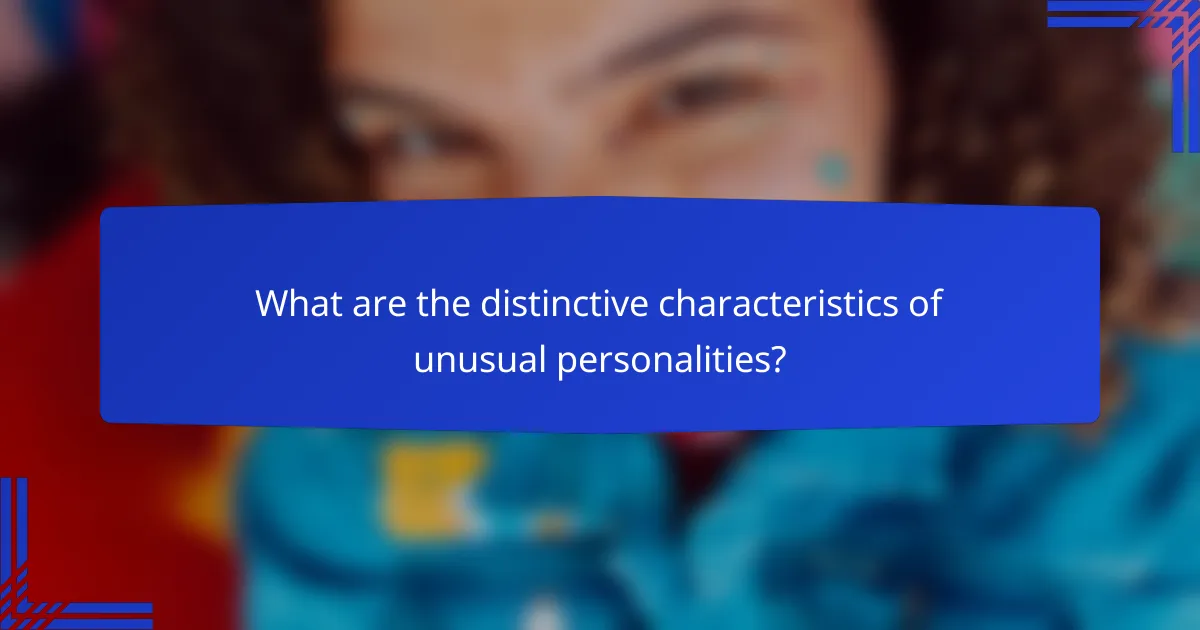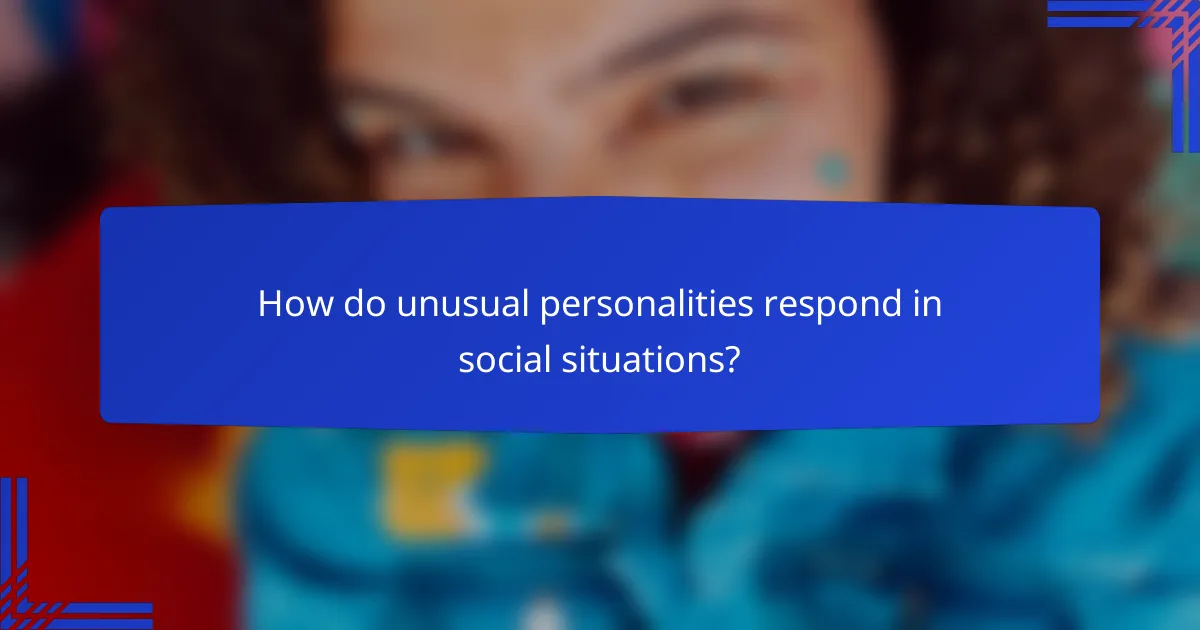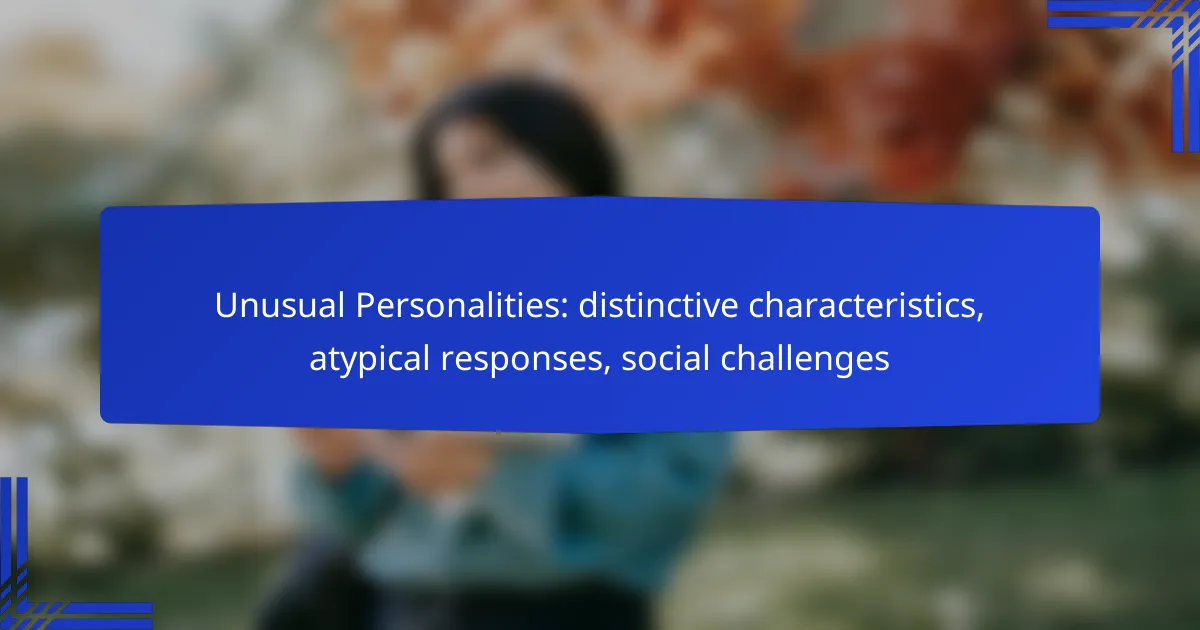Unusual personalities are characterized by distinctive traits that often set them apart from societal norms, such as heightened sensitivity and unique thought processes. These individuals may respond to social situations in atypical ways, leading to challenges in communication and relationship-building. As a result, they often face significant social hurdles, including misunderstanding and isolation from their peers.

What are the distinctive characteristics of unusual personalities?
Unusual personalities often exhibit distinctive characteristics that set them apart from the norm. These traits can include heightened sensitivity, unique ways of thinking, and a tendency to respond emotionally in ways that may not align with societal expectations.
High sensitivity to stimuli
Individuals with unusual personalities frequently display a high sensitivity to external stimuli, such as noise, light, and social interactions. This sensitivity can lead to feelings of overwhelm in busy environments, prompting them to seek quieter, more controlled settings.
For example, a person may feel drained after attending a crowded event, needing time alone to recharge. Understanding this trait can help others provide support by recognizing when someone needs a break from stimulation.
Unique cognitive processing
Unusual personalities often engage in unique cognitive processing, which can manifest as unconventional problem-solving approaches or creative thinking. They may connect ideas in ways that others do not, leading to innovative solutions.
This cognitive style can be beneficial in fields that value creativity, such as art or technology. However, it may also pose challenges in traditional settings where linear thinking is preferred.
Strong emotional responses
People with unusual personalities typically experience strong emotional responses, which can be both a strength and a challenge. They may feel emotions more intensely, leading to deep empathy or passionate reactions.
While this emotional depth can enhance relationships, it can also result in difficulties managing feelings in stressful situations. Learning emotional regulation techniques can be beneficial for navigating these challenges.
Non-conformist behavior
Non-conformist behavior is a hallmark of unusual personalities, often leading them to challenge societal norms and expectations. They may prefer to express themselves in ways that diverge from mainstream culture, whether through fashion, lifestyle choices, or opinions.
This tendency can foster individuality and creativity but may also result in social isolation or misunderstanding from peers. Embracing this uniqueness while finding supportive communities can help mitigate these challenges.
Creative thinking patterns
Creative thinking patterns are prevalent among individuals with unusual personalities, allowing them to approach tasks and problems from fresh perspectives. They often think outside the box, generating ideas that others might overlook.
Encouraging environments that value creativity can help these individuals thrive. Engaging in brainstorming sessions or collaborative projects can harness their unique thinking styles effectively.

How do unusual personalities respond in social situations?
Unusual personalities often respond in social situations with distinctive behaviors and reactions that can differ significantly from typical responses. These individuals may exhibit unique communication styles, unconventional methods for resolving conflicts, and a tendency to withdraw from social interactions.
Atypical communication styles
Atypical communication styles can manifest in various ways, such as using unconventional language, non-verbal cues, or even silence. For example, someone with an unusual personality might prefer to express themselves through art or writing rather than speaking directly. This can lead to misunderstandings in social settings, as others may misinterpret their intent or emotional state.
To navigate these communication challenges, it’s helpful to be patient and open-minded. Listening actively and asking clarifying questions can foster better understanding and connection. Recognizing and respecting these differences can enhance interactions and reduce frustration.
Unconventional conflict resolution
Individuals with unusual personalities often approach conflict resolution in non-traditional ways. Instead of engaging in direct confrontation, they may prefer to withdraw temporarily or seek alternative solutions that avoid escalation. This can include mediation through a third party or creative problem-solving techniques.
To effectively manage conflicts with these individuals, consider adopting a collaborative approach. Encourage open dialogue and explore various options together, which can lead to more satisfactory resolutions for all parties involved. Avoiding aggressive tactics is crucial, as it may lead to further withdrawal or resistance.
Social withdrawal tendencies
Social withdrawal is a common tendency among those with unusual personalities, often stemming from feelings of discomfort or anxiety in social situations. They may choose to isolate themselves to recharge or avoid overwhelming interactions. This behavior can be misinterpreted as aloofness or disinterest by others.
To support individuals who exhibit social withdrawal, it’s important to create a welcoming environment. Allow them the space to engage on their terms, and offer invitations without pressure. Understanding their need for solitude can help maintain relationships while respecting their boundaries.

What social challenges do unusual personalities face in Canada?
In Canada, individuals with unusual personalities often encounter significant social challenges that can hinder their ability to connect with others. These challenges include difficulties in forming relationships, being misunderstood by peers, and facing stigmatization and isolation.
Difficulty in forming relationships
Unusual personalities may struggle to form relationships due to their distinctive traits and behaviors that can be perceived as eccentric or unconventional. For instance, they might have unique interests or communication styles that do not align with societal norms, making it hard to find common ground with potential friends or partners.
To navigate this challenge, individuals can benefit from seeking out communities or groups that share similar interests. Engaging in activities that promote social interaction, such as clubs or workshops, can also provide opportunities to meet like-minded people.
Misunderstanding by peers
Misunderstandings often arise when unusual personalities express themselves in ways that others find confusing or off-putting. Their atypical responses to social cues can lead to misinterpretations, causing peers to view them as aloof or unapproachable.
To mitigate misunderstandings, clear communication is essential. Individuals can practice articulating their thoughts and feelings more explicitly, which may help peers better understand their perspectives and intentions.
Stigmatization and isolation
Stigmatization can lead to isolation for those with unusual personalities, as societal norms often favor conformity. This stigma can manifest in social exclusion or negative stereotypes, further alienating individuals from their communities.
To combat stigmatization, it is crucial for individuals to foster self-acceptance and seek supportive environments. Connecting with mental health professionals or support groups can provide valuable resources and a sense of belonging, helping to counteract feelings of isolation.

What strategies can help unusual personalities thrive socially?
Unusual personalities can thrive socially by leveraging supportive networks, practicing social skills, and seeking professional guidance. These strategies help individuals navigate social situations more effectively and build meaningful connections.
Building supportive networks
Creating a supportive network is crucial for unusual personalities to feel accepted and understood. This can involve connecting with like-minded individuals through clubs, online communities, or interest groups that share similar passions or experiences.
Consider engaging in local meetups or forums where unique traits are celebrated. Such environments foster acceptance and allow for authentic interactions, reducing feelings of isolation.
Practicing social skills
Practicing social skills can significantly enhance social interactions for those with unusual personalities. Role-playing scenarios with trusted friends or family can help improve confidence and ease anxiety in real-life situations.
Additionally, attending workshops focused on communication techniques can provide valuable tools. Simple practices such as active listening, maintaining eye contact, and using open body language can lead to more successful social engagements.
Seeking professional guidance
Professional guidance can offer tailored strategies for unusual personalities facing social challenges. Therapists or counselors can provide insights into social dynamics and help develop coping mechanisms for anxiety or discomfort in social settings.
Support groups led by professionals can also be beneficial, offering a safe space to share experiences and learn from others. This structured environment can help individuals gain confidence and improve their social skills over time.

How can unusual personalities leverage their traits in the workplace?
Unusual personalities can leverage their distinctive traits in the workplace by embracing their unique approaches to problem-solving and collaboration. By recognizing their strengths and adapting their responses, they can contribute significantly to team dynamics and project outcomes.
Creative problem-solving
Individuals with unusual personalities often excel in creative problem-solving due to their ability to think outside conventional frameworks. They can approach challenges from unexpected angles, leading to innovative solutions that others might overlook.
To harness this strength, workplaces should encourage brainstorming sessions where unconventional ideas are welcomed. Techniques like mind mapping or lateral thinking exercises can help these individuals express their creativity effectively.
Innovative project contributions
Unusual personalities can bring fresh perspectives to project contributions, often suggesting novel methods or tools that enhance productivity. Their willingness to experiment can lead to breakthroughs that traditional approaches might miss.
Employers can support this by providing a flexible environment that allows for trial and error. Recognizing and rewarding innovative contributions can motivate these individuals to share their ideas more freely.
Unique perspectives in teamwork
In team settings, individuals with unusual personalities often offer unique perspectives that can enrich discussions and decision-making processes. Their different viewpoints can challenge the status quo and encourage teams to explore diverse solutions.
To maximize the benefits of these unique perspectives, teams should foster an inclusive culture where all voices are heard. Regular feedback sessions can help integrate these insights into the team’s workflow, ensuring that everyone feels valued and engaged.

What role does self-awareness play for unusual personalities?
Self-awareness is crucial for unusual personalities as it helps them understand their distinctive traits and how these traits affect their interactions with others. By recognizing their unique characteristics, they can navigate social situations more effectively and mitigate potential challenges.
Understanding one’s unique traits
For individuals with unusual personalities, self-awareness involves recognizing specific traits that set them apart, such as heightened sensitivity, unconventional thinking, or atypical emotional responses. This understanding allows them to appreciate their strengths, such as creativity or problem-solving skills, while also acknowledging potential weaknesses, like difficulty in social settings.
Navigating social interactions
Self-awareness enables unusual personalities to anticipate how their behavior may be perceived by others. For instance, someone who tends to speak bluntly can learn to soften their approach in sensitive situations. This awareness can lead to more positive interactions and reduce misunderstandings.
Improving emotional regulation
Being self-aware helps individuals with unusual personalities manage their emotions more effectively. They can identify triggers that lead to intense reactions and develop coping strategies, such as mindfulness techniques or breathing exercises. This proactive approach can enhance emotional stability and resilience in challenging situations.
